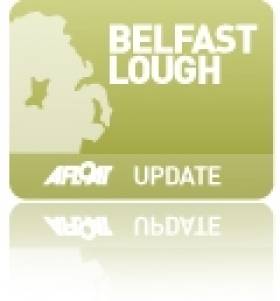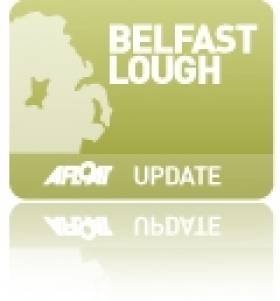Displaying items by tag: Nirkra
New Signings Boost NI Restricted Keelboat Racing Association (NIRKRA)
Since its formation in the early days of 2014 the Northern Ireland Restricted Keelboat Racing Association (NIRKRA) has made significant strides around and beyond the waters of Belfast Lough writes Tom Jobling. The class claims It is the fastest growing keelboat class in the country. Proof of this was evident at their recent 2015 planning meeting at Ballyholme Yacht Club; a transfer to a larger room was necessitated to accommodate the turnout of members.
Tom Bell, secretary of NIRKRA said; "This is an owner-controlled class aimed at 'small keelboats' and designed to give competitive close quarter racing, but at reasonable costs." Robin Gray, the international race officer, added; "The emphasis is on keeping the class within a tight rating band so that racing can indeed be as close as can be. To this end, we use the RYA's NHC handicap system – it has worked a treat for us."
NIRKRA has already attracted a variety of craft into the class – designs include: Manzanita, Starflash, Gibb Sea 80+, Bolero, Contessa 26, Ruffian 23 and Eyghtene 24... Already a number of new signings have joined the fleet in advance of the incoming season. These range from Sonatas to a Polish designed quarter tonner, the Conrad 760. This is very much a 'small acorns' nautical tale... and this season NIRKRA comes of age.
The main NIRKRA activity this season will centre around its monthly Super Sunday 'challenge' series; comprising three back-to-back, windward/leeward races with an early start, the first gun explodes at 10:00 hours! The early start allows the fleet to be ashore for a 'late lunch' — the après sail aspect is a major consideration for the membership; they're commonly referred to as 'nirks'...
As well as their Super Sunday outings, 'nirks' will be supporting the local Belfast Lough Yachting Conference regatta programme, as well as, the Royal North of Ireland YC's Brewin Dolphin Keelboat weekend. They will also have strong representation at the Volvo Dun Laoghaire week.
NIRKRA SUPER SUNDAY Challenge dates:
June 7th Royal Ulster YC
June 28th Carrickfergus SC
Aug 2nd Ballyholme YC
Sept 6th East Antrim BC
#nikra – Despite the horrendous weather which had encircled Northern Ireland last weekend a tiny window opened to allow the August "Challenge" races of the Northern Ireland Restricted Keelboat Racing Association (NIRKRA) to proceed on Belfast Lough. A Bangor bay morning of sun-drenched competition, which after a series of light weather windward-lee races, in turn, saw the crowning of a new 'King Nirk'.
NIRKRA is an owner controlled class designed to give good, competitive, close racing at a reasonable cost. It is aimed at small racing keelboats within the Province with the emphasis on keeping the class in a small rating band so racing is as close as can be. NIRKRA racing is currently run under the RYA's NHC system.
With the NHC numbers revised after the previous 'Super Sunday,' none of the fleet were sure who would profit after the mathematics had had their day. Proceedings were opened by the crew of QT-pi who were taking no chances; at the helm, Ballyhome's Charlie Taylor drove the Gibsea80+ into a commanding lead gained from the second windward leg, and held it to the finish. The Starflash of Alan Morrison & John Simms were second on the water, with the defending 'NIRK' Prodigal, third.
In race two the same three boats were swapping places on the water with Prodigal gaining the final advantage from Starflash and QT-pi. However on corrected time it was the 'Starflashers' who profited yet again. The latest addition to the fleet, Nick & Davy Quinn's Eygthene 24, Chatterbox took third place, and then topped off his Super Sunday with second place in the final race!
For the final race, the wind Gods played their closing card. A lifeless starting line saw most of the fleet in irons. But as the wind again swept in from the west, the last boat away became the first to round the weather mark! Prodigal lead the fleet home, but a surging Starflash was close enough to make it three wins in row on corrected time; it was indeed a 'Super Sunday' for the home club - Ballyholme Yacht Club.
Ashore at BYC, and organised by NIRKRA secretary Tom Bell, the fleet enjoyed a Gourmet Barbeque as well as a 'live session' from the next county Down music superstar Sam Wickens.
RESULTS
POS BOAT TYPE OWNER CLUB SCORE
1 Starflash Starflash A. Morrison/J. Simms Ballyholme YC 3
2 Prodigal Bolero TN Jobling East Antrim BC 9
3 Chatterbox Eygthene24 D&N. Quinn Ballyholme YC 10
4 QT-pi Seagib 80 J. Coffey/T. Bell Royal Ulster YC 11
5 Mumbo Jumbo Contessa 25 C. West-Hirst/K. Storey Royal Ulster YC 12






























































